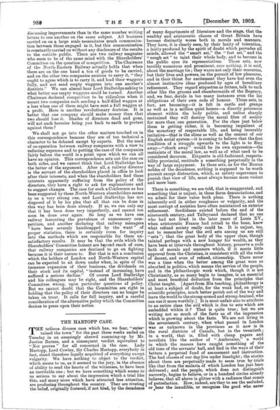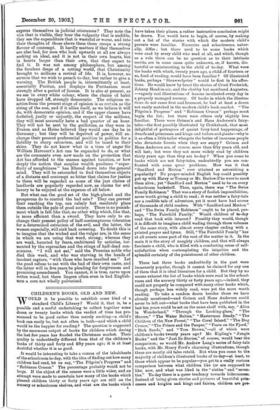THE HARTOPP CASE. T HE tedious divorce case which has, we
fear, "enter tabled the town" for the past three weeks ended on Tuesday in an amazingly shrewd summing-up by Mr. Justice Barnes, and a consequent verdict equivalent to " Not proven " for all concerned in the case. Lady Hartopp, Lord Cowley, Sir Charles Hartopp, everybody in fact, stand therefore legally acquitted of everything except vulgarity. We have nothing to object to the verdict, which seems to us, as it seemed to the jury, in the absence of ability to read the hearts of the witnesses, to have been an inevitable one ; but we have something which seems to us serious to say about the impression which a trial like this, and many more which have attracted less attention, are producing throughout the country. They are riveting the belief, originally fostered, if not bred, by the decadence of many departments of literature and the stage, that the wealthy and aristocratic classes of Great Britain have become distinctly worse both in morals and manners. They have, it is clearly seen, by their laxity of toleration, a laxity produced by the spirit of doubt which pervades all minds, allowed the " smart set," the " fast set," and the " rough set " to taint their whole body, and to become in the public eyes its representatives. These sets, now terribly numerous and prominent, care nothing, it is said, about the marriage tie ; they waste not only their resources, but their lives and powers, on the pursuit of low pleasures, and in their thirst for excitement they have lost even the almost instinctive ideas produced by ages of hereditary refinement. They regard etiquettes as fetters, talk to each other like the grooms and chambermaids of the Regency, and, we fear, deride in too many instances even the lax obligations of their own code of honour. These sets, in fact, are becoming—it is felt in castle and grange as well as in a million quiet homes—a directly poisonous element within the body politic, and unless sharply restrained they will destroy the moral fibre of society for more than one generation. For the class just below them is getting richer, it is becoming impatient of the monotony of respectable life, and being incurably imitative—that is the slime as well as the cement of our English social system—it is coming to believe that the first condition of a struggle upwards to the light is to fling away—"chuck away" would be its own expression—the restraints of the moral law, as well as of what used to be considered decorum. Etiquette is old-fashioned, respecta- bility provincial, rectitude a something perpetually in the way of large enjoyment. In these sets, as for the Roman nobles of the decadence, nothing is supposed to be worth pursuit except distraction, which, as satiety supervenes to punish that view of life, must always become more violent and more base.
There is something, we are told, that is exaggerated, and something that is unjust, in these fierce denunciations, and we admit for their value both pleas. There is nothing inherently evil in either roughness or vulgarity, and the most corrupt of societies have often maintained an exterior refinement. Sordidness existed before the end of the nineteenth century, and Talleyrand declared that no one who had not lived in the later years of Louis XV., when aristocratic France had rotted to the bone, knew what refined society really could be. It is unjust, too, not to remember that the evil sets among us are still " sets "; that the great body of the upper class, though tainted perhaps with a new hunger for wealth, as they have been at intervals throughout history, preserve a code both of morals and manners which, if it meets little approval from the Christian, is consistent with all the rules of decent, and even of refined, citizenship. There never was a time when the better among the great were so absorbed in politics, which means the service of the people, and in the philanthropic work which, though it is not Christianity, as so many begin to imagine, is an essential and most beneficial deduction from the principles that Christ taught. [Apart from His teaching, philanthropy is at least a subject of doubt, for the weak had, on purely scientific principles, much better perish out of the way and leave the world to the strong-armed and strong-brained, who can use it more worthily.] It is most unfair also to attribute to an entire class the evil which is due to sets which are embedded within it ? That is quite true ; but we are writing not so much of the facts as of the impression which is growing about the facts. We are not living in the seventeenth century, when what passed in London was as unknown in the provinces as it now is in the rural districts of Canada, but in the twentieth ; in a world, that is, filled with cheap papers and novelists like the author of " Ambrosine, a world in which the masses have caught something of the old tone of the servants' hall, and find in the ways of their betters a perpetual fund of amusement and instruction. The bad classes of our day live under limelight ; the stories about them are perpetually made to seem true by trials like that from the malaria of which London has just been delivered ; and the people, which does not distinguish narrowly, begins to believe, or in a hundred circles already believes, that all above is glitter with a radiance that comes of putrefaction. How, indeed, are they to see the secluded, or hear the inaudible, or recognise the good who never express themselves in judicial utterances ? They note the vice that is visible, they hear the vulgarity that is audible, they see the expenditure that is wasteful or worse, and into their thoughts of those above them there creeps a strong flavour of contempt. It hardly matters if they themselves are also bad, for men who look upwards at all are always seeking an ideal, and it is not in their own hearts, but in hearts larger than their own, that they expect to find it. It was not among philosophers, but among the feculent dregs of a rotting world, that Christianity brought to millions a revival of life. It is, however, no sermon that we wish to preach to-day, but rather to give a warning. The British people is, intermittently at least, essentially Puritan, and displays its Puritanism most strongly after a period of license. It is also at present, as we see in every white colony, where the chains of habit have dropped off, strongly democratic. The religious re- action from the present stage of opinion is as certain as the rising of the sun, and if it allies itself, as we believe it will do, with democratic opinion, and if the upper classes have forfeited, justly or unjustly, the respect of the millions, they will most assuredly have a bad quarter of an hour. They will not be sent to the guillotine, as they were in France, and as Heine believed they would one day be in Germany; but they will be deprived of power, will ex- change their present preferential position in politica for a liability to sharp ostracism, and will be taxed to their skins. They do not know what in a time of anger Sir William Harcourt's Act can be expanded to do, or what are the comments even now made on the protection that Act has afforded to the masses against taxation, or how deeply the notion that surplus wealth produces " super- fluity of naughtiness " has filtered down into the general mind. They will be astounded to find themselves objects of a distaste and contempt so bitter that claims for justice to them will be regarded as some of the just claims of landlords are popularly regarded now, as claims for evil luxury to be enjoyed at the expense of all below.
But what can the good set of the high-placed and the prosperous do to control the bad sets ? They can prevent their reaching the top, can calmly but resolutely place them outside the pale of good society. There is no punish- ment which is felt like that, no other whip which, like that, is more efficient than a sword. They have only to ex- change their present policy of half-contemptuous toleration for a, determined ostracism of the evil, and the latter, the women especially, will sink back cowering. To doubt this is to imagine that the wicked and the vulgar are, in the sense in which we are using that word, strong ; whereas they are weak, haunted by fears, embittered by satieties, tor- mented by the reproaches and the stings of half-dead con- sciences. "I will not eat," said the Prussian noble who died this week, and who was starving in the hands of insolent captors, " with those who have insulted me." Let the good refuse to eat with the bad of their own caste, and the latter will in five years be pleading for forgiveness and promising amendment. You cannot, it is true, carve upon rotten wood, but there lingers often even in bad English- men a core not wholly pulverised.











































 Previous page
Previous page